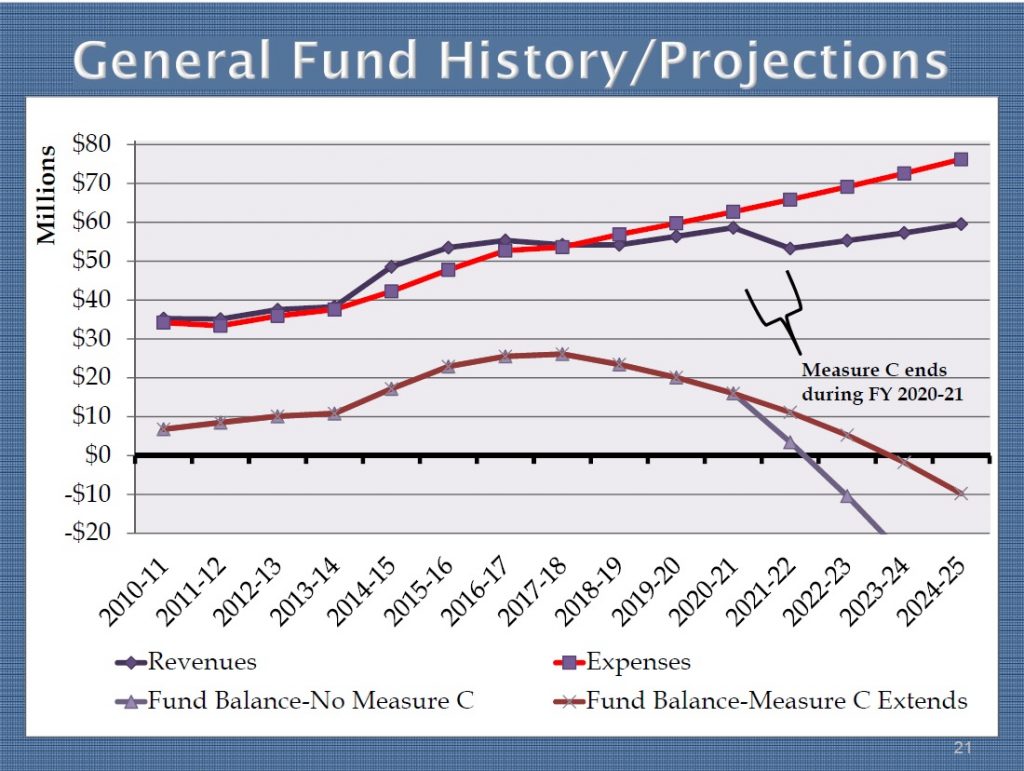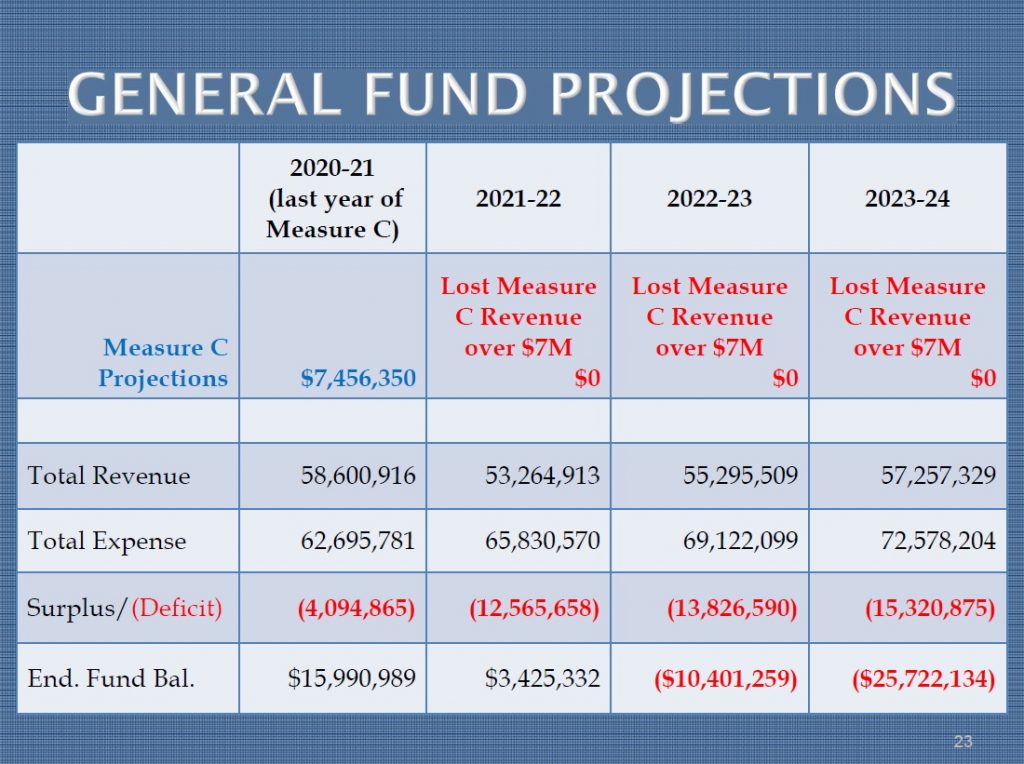City Council learns Antioch again facing bankruptcy, within five years
Monday, April 17th, 2017
In spite of the additional $6 million from Measure C, each year
By Dave Roberts
Antioch’s budget, which teetered on the brink of bankruptcy during the Great Recession resulting in massive employee layoffs, reduction in city services and closure of City Hall one day a week, is once again headed toward bankruptcy unless significant cost-cutting measures are taken. That was the bad news from Finance Director Dawn Merchant at a City Council budget study session on Tuesday, April 11th.
Antioch’s $52.7 million General Fund budget is projected to begin deficit spending by $2.6 million in July of next year due largely to increased police staffing, pay and benefit hikes for all city employees and increased payments to the California Public Employees Retirement System. The deficit spending will occur despite the city receiving more than $6 million annually from the city’s Measure C half-cent sales tax hike that was passed in 2013.
That tax is due to expire in four years. The loss of that revenue would result in the city running a $12.5 million deficit in the fiscal year beginning July 2021, according to budget projections. And the city could be bankrupt and $10 million in debt the following year, increasing to $25 million in debt the year after that.
“It’s really important for council when making any decisions going forward, based on projections going forward, to consider the fact that Measure C needs to be looked at to either be renewed or some other revenue measure in its place,” Merchant told the council. “Otherwise once that ends, the city is going to be in a significant financial bind that we could find ourselves in. We could have to lay off police officers. The Police Department is over 70% of the General Fund budget.”
But employee costs are increasing so fast that even if Antioch voters approve an extension of Measure C, the city could still be facing bankruptcy in the budget year starting July 2023, according to a budget chart. Essentially, extending Measure C would only stave off bankruptcy for about a year and a half. As a result, the council may have to make tough cost-cutting decisions in the coming months before the 2017-18 budget is adopted on June 27.
It’s unclear, however, where those cuts would occur. Employee salary and benefit costs comprise the vast majority of the budget. But instead of holding the line on employee costs, in November the council approved more than $9.2 million in salary and benefit hikes over five years.
The other potential area for cost savings involves quality of life services. The city currently provides:
- $1.1 million in subsidies for recreation programs and the Antioch Water Park, which is projected to increase $107,151 in the next fiscal year.
- $501,222 for Animal Services, which is projected to increase to $873,735 in two years.
- $455,000 for the Lone Tree Golf Course. The course also is years behind on $951,756 in debt service payments to the city, and is unable to repay two other loans totaling $1.1 million.
In addition, the Antioch Marina will need a $120,000 subsidy starting in 2019. And council members have expressed interest in increased funding for the Lynn House Gallery and to begin funding the July 4th and Holiday DeLites events.

Council Member Monica Wilson suggested cutting the city subsidies for the water park, golf course, marina and animal services.
“We are at that point where we really need to make that tough decision on can we carry the weight of the cost in those four areas,” she said. “We have looked at different organizations or companies that would come and maybe finance those things. I go to the golf course from time to time. I think it’s a great thing. But, unfortunately, I don’t think we can keep carrying that load. We’ve definitely come to the point where we need to make that decision on that area.
“On special event funding, we need to look at a definite finite amount of money that we can work with different groups. We need to look at how much longer we can support events. We want to support events but we really have to look at how much we can support the different events. How much are we able to afford to these different events.”
But Mayor Sean Wright advised the council to be cautious in cutting amenities that improve the city’s quality of life.
“When we look at the four subsidies that we do, it’s only $2.7 million, which is about 5% of our total General Fund money,” he said. “If Measure C does not get extended, we run out of reserves in 2022-23. If we do extend it, we’re only extending ourselves an extra two years to really be in that same boat. So really what we’re looking at is an increase in [employee compensation] contracts and an increase in PERS. For us to be able to save $2.7 million still doesn’t get us out of the hole.
“What’s coming as an avalanche is much bigger than $100,000 for events or $2.7 million. So looking at our budget I think we need to be fiscally prudent. But when you’re looking at a police officer or a code enforcement officer or doing things that increase the viability of economic development and community, for us to save $150,000 it’s like taking a large business and deciding that ‘You know what, in three years I’m really going to be suffering so I’m no longer going to market, I’m going to stop marketing now to save the money for three years that we’re going to need.’
“And ultimately what you do is you cause your demise because you stop doing things that would attract future development and future monies. So I think we need to be very careful in our conservative approach to look at what do we need to do to make our community something that economic development wants, that people want to come to, people want to live in, our home values go up so we increase that, we increase property taxes, we increase businesses.
“We need to be very careful. If we limit and cut ourselves, we’re still going to be in the same place. If we save $3 million a year we might postpone it one year, but we’re going to be in the same place with this oncoming avalanche of PERS and increased [employee] costs. We need to be very conservative and prudent, but smart in our decision-making so that we don’t lower the viability of our community. Sometimes spending an extra $100,000 on something that makes our community better, people want to live here, is money well spent in the long run – even though it looks like in three years that may be something we have to be careful of.”
Several residents agreed with Wright that the city should not cut recreation and animal services. Others urged the council to cut costs by renegotiating the contracts with city employees.
“We cannot tax ourselves out of this problem,” said former Council Member Ralph Hernandez. “This has existed for many years. It’s a train wreck that has been heading for a couple of decades. It’s time this council addresses it and takes honest-to-goodness action. Reopen negotiations on [employee] contracts and … be honest with them and tell them the truth: ‘We have X dollars….’ The [employee] organizations meet or they don’t. If they don’t, you impose what is needed to keep this city viable and avoid bankruptcy.”
William Leroy was also concerned about employee costs, which include $142 million in the city’s unfunded liability for retirement benefits.
“There’s over half a million dollars sitting up there in campaign contributions that got you into the seats you’re in,” he said. “And we pretend that that’s the taxpayers donating money to your campaign, when in fact we know it’s so that you can get up there and do the unpalatable like passing taxes. The way the system works is the police endorse you because you turn around and endorse their pensions and wages. And I can’t blame them for wanting more money. I do blame you….
“It continues on this game of pretending you are not bought and paid for, when in fact you are. You don’t represent us. You take our money. I think the police ought to be arresting you because that’s called theft. I’m really sad that you do this. I wish somebody would break out of the ranks and do something honest and good for the people of Antioch.”
The council’s next budget study session is scheduled for April 25 in which they will discuss the five-year capital improvement program and any outstanding issues from Tuesday’s session.














 Los Medanos College (LMC) will host the annual “Celebrating the Life of César Chávez” recognition program on Friday, April 14, at its Pittsburg Campus; the reception will begin at 6:00 p.m. in the College Complex Indoor Quad, followed by the award presentations at 7:00 p.m. in the Recital Hall. The campus is located at 2700 East Leland Road in Pittsburg. The celebration is free and the public is encouraged to attend. Complimentary, easy-access parking is available in Lot C for this event.
Los Medanos College (LMC) will host the annual “Celebrating the Life of César Chávez” recognition program on Friday, April 14, at its Pittsburg Campus; the reception will begin at 6:00 p.m. in the College Complex Indoor Quad, followed by the award presentations at 7:00 p.m. in the Recital Hall. The campus is located at 2700 East Leland Road in Pittsburg. The celebration is free and the public is encouraged to attend. Complimentary, easy-access parking is available in Lot C for this event.
 Do you have a talent, and want to show it off? Enter your arts and crafts, best apple pie, photography, painting, cut flower, or largest home grown tomato. Imagine the
Do you have a talent, and want to show it off? Enter your arts and crafts, best apple pie, photography, painting, cut flower, or largest home grown tomato. Imagine the 











